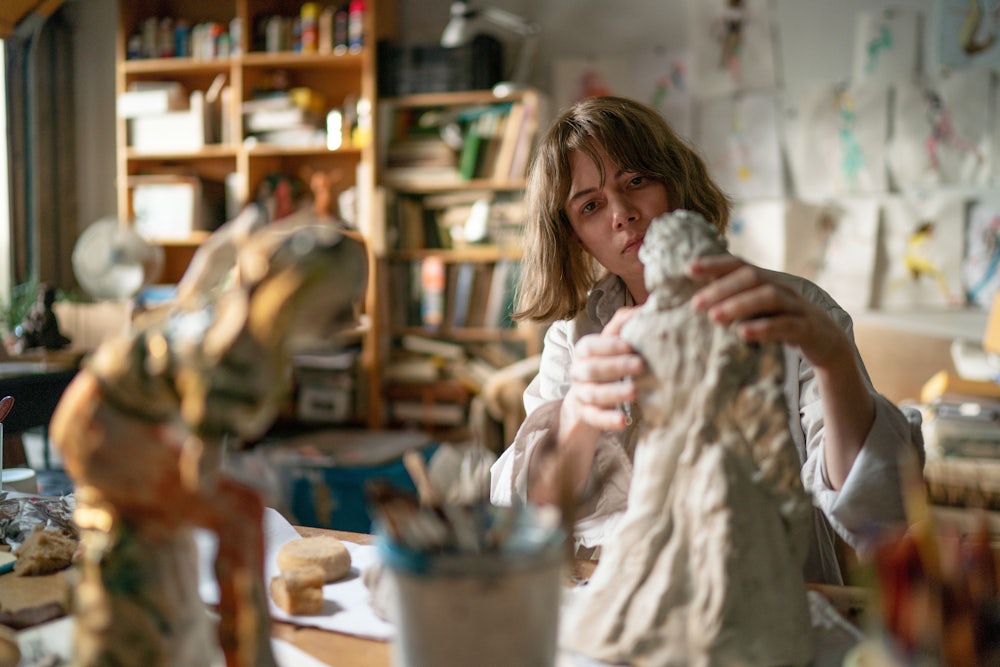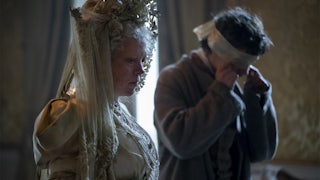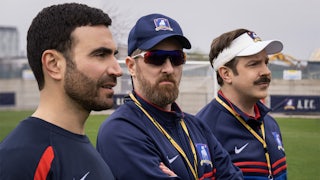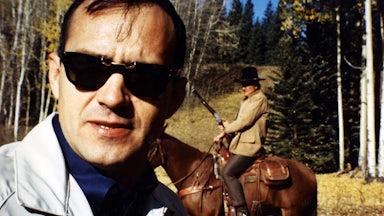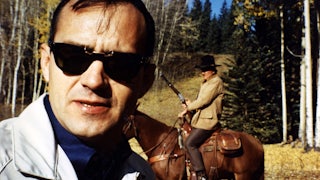Kelly Reichardt is a master of American frustration. In her first feature, River of Grass, two incompetent would-be criminals lack the funds and motivation to properly go on the run. In Wendy and Lucy, a poverty-stricken woman becomes stranded in Oregon after her car breaks down and loses her beloved dog. Reichardt’s 2019 film First Cow, set in the Oregon Territory circa the 1820s, follows two poor men who steal milk from a wealthy English trader, an attempt to exploit their exploiters that ends tragically. A simple, potent through line runs through her work—ordinary people in familiarly onerous situations trying to eke out a living against the backdrop of impressive landscapes, whose natural beauty masks society’s cruel indifference.
The lighter touch of her new film, Showing Up, marks something of a tonal departure. Set in the insular world of fine art, the film follows a sculptor, Lizzy (Michelle Williams), navigating a series of personal and artistic crises in the week before her new show opens. Her apartment has no hot water, and her landlord, Jo (Hong Chau), who’s also her neighbor and friendly professional rival, has been slow to get it fixed, partly because she’s prepping for two shows, something she casually boasts about to Lizzy. Jo also subtly guilts Lizzy into helping her nurse an injured bird, which Lizzy tried to quietly discard after her cat attacked it in her apartment the previous evening. Meanwhile, her brother is in the midst of a mental health crisis, two mooching boarders are taking advantage of her oblivious father, and her mother offers little emotional support.
At first glance, the creative and professional stakes in Showing Up might seem lower than those in Reichardt’s other films. The premise lacks the epic quality of, say, Meek’s Cutoff—whose characters embark on a doomed trek through the Oregon High Desert led by an arrogant frontier guide—or Night Moves, in which radical environmentalists blow up a dam.
Yet Showing Up’s exploration of an artist’s life in contemporary society carries its own unique weight in line with Reichardt’s socially conscious filmography. The creation of art in today’s hostile modern culture is a political act, she implies, and questions of who gets to make it, how it gets done, and who sees it lie at the tainted nexus of money and access. But instead of making Showing Up an “issue film,” Reichardt deploys a character-driven comedic framework, the core of which is personal frustration.
Like Reichardt, Lizzy makes small-scale art; the beauty of her ceramic sculptures lies in their handmade details. Both Jo and Lizzy have earned recognition for their art, but the scale of Jo’s vast installation work renders it more accessible in a world that tacitly equates size with importance. Meanwhile, Lizzy’s pieces demand a certain amount of attention and consideration out of step with the culture.
Practical anxieties (the inability to freely take a shower, chest-tightening deadline pressure) dominate Showing Up, which takes a refreshingly unromantic view of artmaking. Since Lizzy balances an administrative job at the college with preparation for her show, she’s forced to take a personal day to finish up some pieces, but it ultimately gets slightly derailed by the demands of the wounded bird. Work can’t wait for inspiration when it simply needs to get done, and distractions impede material progress. Lizzy’s family problems generate even more stress. Her mother defends her brother’s concerning behavior by saying that he’s always been creative, to which Lizzy contemptuously responds, “Lots of people are creative”: Creative work demands a certain level of professional consistency.
Reichardt peppers Showing Up with scenes of Lizzy sculpting in her garage and art students honing their craft under the supervision of instructors at the college. Cinematographer Christopher Blauvelt imbues these scenes with tenderness and good humor, observing with a documentarian’s eye how even courses often derided as silly, like an interpretive dance class titled “Thinking and Movement,” require tremendous labor. (These scenes also serve as a sly tribute to the Oregon College of Art and Craft, where Reichardt set the film, which sadly closed in 2019 after 112 years of operation.)
While Lizzy might relish being left alone with her cat and her work, she’s also dependent on those around her—she relies on the school’s kiln master to complete her work, she desires the approval of her parents, she wants to be recognized by her more successful contemporaries. This tension between craving isolation but needing other people leaves her frequently exasperated, especially when others don’t fit in to her schedule. In contrast, Jo walks through life with positivity and it’s reciprocated in kind, which Lizzy resents and covets. Reichardt is one of the few American filmmakers who organically relates to the ways that people with prickly, uningratiating personalities, especially women, often unfairly lose out socially and professionally.
Per its title, Showing Up captures the difference between how much time Lizzy devotes to supporting her friends and family (if begrudgingly) and how little she believes they support her. She keeps tending to and checking in on the injured bird even after Jo takes over the care. She can’t accept her mother’s help with her brother without constantly monitoring his condition.
Lizzy’s sensitivity and spikiness combine to occasionally blind her to the encouragement that others give her. There is only a brief moment during an unexpected interruption at the gallery that shows, in one tight frame, the number of people who attended Lizzy’s show. This affirming note doesn’t feel false or artificial, partially because Reichardt doesn’t hang a lampshade on it, and presents it as merely a brief respite. Lizzy will have to deal with a seemingly endless torrent of mundane problems that will keep her aggravated for many shows to come. But for these few seconds, there is validation.
Reichardt’s films tend to be minimalist dramas sensitive to the feeling of open space and to delicate emotional changes. Showing Up is her first comedy, both tonally—a light air befitting its Portland setting pervades the film—and in its structure (it’s no spoiler to say that it literally ends with a reconciled couple walking into a sunset). In the film’s press kit, co-writer and longtime collaborator Jon Raymond cites 1970s “soft, situational comedies,” like the early films of Elaine May and Claudia Weill’s Girlfriends, as inspiration. It’s easy to see the ways in which Showing Up takes its cues from those social comedies, with its focus on the farcical minefield of human interaction, the intrusion of daily life onto crucial tasks, and the complicated, unspoken emotions beneath a nonchalant attitude.
Every time something takes Lizzy away from the tasks she needs to complete, she gets more wound up, like a pressurized soda can. The comedy lies in watching Michelle Williams play Lizzy’s mounting frustration: her short, tetchy responses to silly queries, her permanently furrowed brow, her misguided stress and her impatience. Though her preferred modes are passive aggression and low-boil anger, her reactions are funny the way Daffy Duck’s or Basil Fawlty’s exasperation is funny.
Through this comedy, however, Reichardt pays careful attention to the subtle ways that emotions undulate. Though Lizzy and Jo are friends and neighbors, their friendship is burdened by professional jealousy and a landlord-renter dynamic. Lizzy acts more generously toward Jo when she’s had a productive day, but when something goes wrong, she takes her frustration out on her frenemy, indignantly reminding her of the hot water issue she’s repeatedly failed to address. On the other hand, Jo’s upbeat disposition often translates as arrogance and unintentional manipulation. Dynamics can imperceptibly shift beneath the feet of people who know each other all too well.
Reichardt’s talent at drawing out the social or political dimensions in small moments finds unique purchase in Showing Up. Without being didactic, her films are a testament to the ways people are ineluctably products of their environment: The duo in First Cow resort to theft to escape their fixed economic station, just as the protagonists of Certain Women actively try to puncture their culture of alienation. Showing Up’s unassuming canvas carries the weight of creation—its difficulty and necessity in atomized times—and though it never preaches, Reichardt maintains there’s worth to the work, even if the precarity never disappears.
